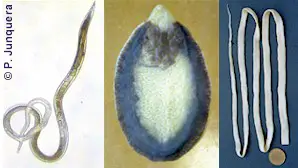Internal parasites (endoparasites, worms, helminths)
Gastrointestinal roundworms (nematodes)
-Kathy
Gastrointestinal roundworms (nematodes)
- Acuaria spp ~ Dispharynx ~ Synhimanthus spp. $. Gizzard worms. Gizzard, esophagus and proventriculus. Can be a problem in endemic regions, mainly in birds kept outdoors.
- Ascaridia spp. $$$. Chicken roundworms. Small intestine. A serious problem worldwide, also in confined operations.
- Capillaria spp. $$. Hairworms. Crop, esophagus, small intestine, large intestine.
- Heterakis spp. $$$$. Cecal worms. Cecum. Probably the most threatening worms in all kind of poultry operations worldwide.
- Oxyspirura spp. $. Fowl eyeworms. Eyes. Usually a secondary problem in individual birds kept outdoors.
- Strongyloides spp. $$. Threadworms, pinworms. Small intestine. Can be a serious problem worldwide.
- Subulura spp. $. Cecum and small intestine. A secondary problem in birds kept outdoors worldwide.
- Syngamus trachea. $$. Gapeworms. Trachea, bronchi. A serious problem in birds kept outdoors in endemic regions.
- Tetrameres spp. $. Proventriculus and esophagus. Can be a problem in endemic regions, mainly in outdoor opertaions.
- Amoebotaenia cuneata = sphenoides. $. Small intestine. Usually a secondary issue in most poultry operations
- Choanotaenia infundibulum. $. Small intestine. Usually not a major issue in modern poultry operations.
- Davainea proglottina. $. Minute tapeworms. Small intestine. Can be a problem in birds kept outdoors in endemic regions.
- Raillietina spp. $$. Small intestine. The most frequent tapeworm in poultry, however normally not a major problem.
- Prosthogonimus spp. $. Oviduct flukes. Oviduct, bursa of Fabricius. Can be a serious threat for birds kept outdoors in endemic regions.
-Kathy





